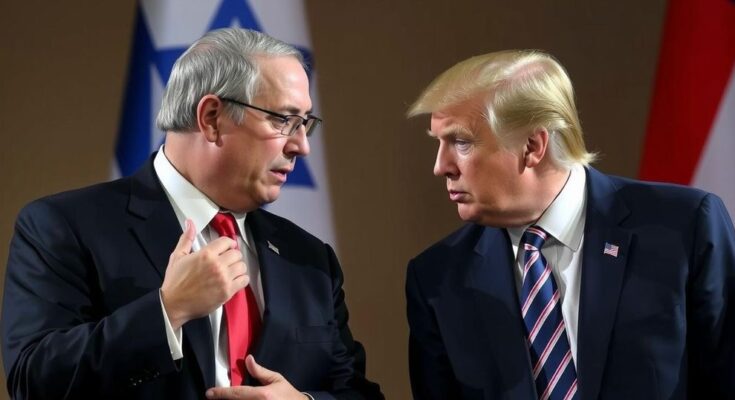Benjamin Netanyahu has expressed alignment with Donald Trump on Iran, emphasizing their joint stance on the danger it poses. Following significant talks, he highlighted opportunities for peace and growth for Israel. Tensions remain high, with escalating hostilities evident in Lebanon and Gaza, and international eyes are focused on U.S. policy changes stemming from the administration transition.
Israeli Prime Minister Benjamin Netanyahu has articulated a shared perspective with U.S. President-elect Donald Trump regarding the Iranian threat, emphasizing their mutual understanding of the issues at hand. In a recent declaration, Netanyahu revealed that he has communicated with Trump on three occasions since the election, aiming to fortify the bond between their nations. The Israeli leader regards these discussions as significant and productive, highlighting opportunities for peace and growth for Israel amid regional challenges. Netanyahu stated, “We see eye to eye on the Iranian threat in all its components, and the danger posed by it.” In light of ongoing tensions, particularly after recent Hamas attacks, the situation between Israel and Iran remains precarious. There have been retaliatory military actions from both sides over the past year, including assaults from Iranian proxies situated in Gaza and Lebanon. Amidst this chaotic backdrop, the international community is closely monitoring how the transition to the Trump administration may alter U.S. policies regarding the ongoing conflict in Gaza and Israel’s tactical operations in the region. Such developments are unfolding concurrently with Israel’s airstrikes in southern Lebanon and northern Gaza, resulting in significant casualties, including civilians. Reports indicate that at least 23 individuals perished in a recent airstrike in Aalmat, a Lebanese village, while additional strikes in Jabaliya refugee camp claimed numerous lives. As the Israeli Defense Forces assert their military objectives, experts are increasingly concerned about food security and the prospect of famine in Gaza, with dire implications for the local population.
The conflict between Israel and Iran has escalated over recent years, with Iran supporting proxy groups such as Hamas and Hezbollah, which have engaged in military actions against Israel. The change in U.S. administration raises questions regarding future American foreign policy and its impact on this pivotal geopolitical struggle. Trump’s return is anticipated to reshape Israel-U.S. relations, especially concerning strategies to confront perceived Iranian threats to regional stability. This context highlights the strategic importance of Netanyahu’s recent discussions with Trump, as they aim to enhance collaboration against a common adversary.
In conclusion, Prime Minister Benjamin Netanyahu’s affirmation of a shared viewpoint with President-elect Donald Trump regarding the Iranian threat underscores the significance of U.S.-Israeli relations. The discussions hold potential for strengthened alliances as both leaders seek to navigate the complex dynamics of regional security and peace in the wake of ongoing violence and humanitarian crises. Observers will be keenly watching how these newfound alliances will shape future U.S. policies and their implications for the Middle East.
Original Source: news.sky.com




